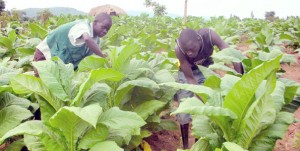As the sixth session of the Conference of the Parties (COP) to the World Health Organisation Framework Convention on Tobacco Control (WHO FCTC) approaches, the Environmental Rights Action/Friends of the Earth Nigeria (ERA/FoEN) has alerted African governments on the need to be wary of tobacco industry exaggeration of farmers’ gains.

The undue attention of the tobacco transnational on so-called prosperous farmers is a ploy to weaken the resolve of delegates attending the COP to push through sustainable alternatives to tobacco farming at the talks, alleges the Lagos-based organisation.
ERA/FoEN insists the call had become urgent in view of the increase in tempo of visibility events organised by cigarette makers and leaf buyers through the International Tobacco Growers Association (ITGA) and its allies in different countries in the last two months which, it said, not only disparage the treaty talks but also serve as platforms for making bogus claims on tobacco farming.
Visibility events have been ongoing in several African countries including Tanzania, Zambia, Uganda and Zimbabwe, claims the civil society body.
According to the organisation, the British America Tobacco (BAT) in Nigeria portrays local tobacco farmers as prosperous, but paints a gloomy picture for farmers as endangered species when legislations that will domesticate the Framework Convention on Tobacco Control (FCTC) finally become law.
“Farmers who spoke with ERA/FoEN during a recent industry monitoring visit in South West Nigeria said that media reports portraying them as successful were exaggerated as most of them spend virtually every day tending tobacco leaves and would require soft loans from government,” states the ERA/FoEN Director, Corporate Accountability, Akinbode Oluwafemi.
He adds: “It is extremely vexing to know that ITGA is one of the vehicles that transnationals like BAT consistently use to tie down tobacco farmers who want to transit. The renewed vigour with which the industry is poking legislations that will guarantee healthy environments is not one that should be treated with levity. African governments must act immediately and concertedly.
“Like in Malawi, and countries in East Africa, farmers in Nigeria are now victims of an industry that portrays them as prosperous while in actual fact they are pawns in the web of an industry that deliberately keeps prices of leaves so low that they (the farmers) make almost nothing from tobacco growing.”
Nigeria spokesperson of the Network for Accountability of Tobacco Transnationals (NATT), Philip Jakpor, submits: ‘No one is left in doubt that ITGA presents the face of farmers to the public while in actual fact it is a pawn that was created to do the bidding of the industry only.”
Jakpor notes that ample examples reinforce the position of ERA, NATT and other civil society groups on ITGA’s objectives, including a recent meeting of the group in Harare on July 1, 2014, where its president Francois Van Der Merwe advocated the organisation be given a slot at the COP6.
Similarly, a group of tobacco farmers on the platform of the Uganda Tobacco Growers Association (UTGA) recently wrote to the Ugandan parliament demanding the removal of clauses that prohibit partnerships and endorsements including voluntary contributions, and incentives or privileges that promote tobacco businesses in the Ugandan Anti-Tobacco Bill 2014 – all of which are prescribed by the FCTC, of which Uganda is a member.
Jakpor adds: “African governments must now encourage farmers that are locked down to transit to proven alternatives that are sustainable and environment-friendly. In addition, governments should explore ways to ensure that farmers and farm workers receive fair leaf prices. Collusion over prices among tobacco companies must be stopped.
“Guidelines of Article 5.3 of the FCTC de-normalise treating tobacco companies (and their front groups) as stakeholders in public health policy. It is for this reason that African governments must rise up to the occasion by deploying resources to make it easy for tobacco farmers to transit and embrace alternatives that are safe and sustainable.”
